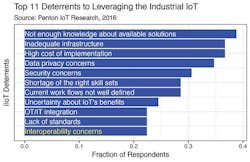Legacy Systems: The Real Stinker in the Room?
Last month, we here at IW held our annual Manufacturing and Technology Conference, and by all accounts it was a big success. Attendance was up. The feedback from attendees and exhibitors was positive. And social media was buzzing about the event.
I had the opportunity to attend many excellent conference sessions, on topics ranging from big data and smart manufacturing to the Industrial IoT. And like all media professionals covering an event like this, I set out looking for the one theme that tied everything together this year.
IoT was hot. Big data and the cloud were, well, big. Many talks focused on continuous improvement and how manufacturers are continuously improving.
But the one thing that stood out for me was a topic that was not openly addressed much during the sessions, but instead was a strong undercurrent running throughout the event.
That topic? Coping with legacy systems and interoperability when implementing new technologies, systems, and processes.
And if some of the comments at M&T were any indication, it’s definitely a real stinker:
“The biggest thing I take away from smart manufacturing is, ‘How do I integrate my legacy systems?’”
“Legacy systems are our biggest hurdle.”
“We run two dozen power presses varied in age and control configuration and want to display machine status on factory and office monitors, but the commercial systems are much too expensive for us to deploy.”
I think that people are all too aware of the difficulties (aren't you?)—in a recent study we conducted on manufacturers’ readiness for the Industrial Internet, dealing with legacy systems and interoperability tied for eighth place on the list of impediments to faster adoption of the IIoT (see chart below).
But given the conversations at M&T, it kind of baffles me why the topic of legacy systems didn’t place higher on the list. First, even. Moreover, I wonder why it gets so much less air time than, say, data security or smart manufacturing.
The reality is that almost everyone has some sort of legacy system to deal with, whether it’s machines of various vintages and conditions, an MES, or an aging AS/400 midrange server. (One attendee grimaced at the prospect of migrating that beast.)
And in an increasingly software driven world, it’s only going to get worse.
I can appreciate that it’s a complicated thing to talk about, given the infinite permutations of interoperable things that need to be made to work together; the need to keep production running during an upgrade; the unknowingness of what happens when you mash old and new together.
But it seems to me that dealing with legacy systems is way too important a topic to sweep under the carpet.
We need more honest, open conversations—among vendors, users, and would-be users--about the realities of integrating legacy hardware and software. The more real-world information that gets shared, the greater clarity with which manufacturers can understand what they’re getting into; the more they will learn from other’s experiences, and, perhaps most importantly, real best practices will emerge.
At next year’s M&T event, in Raleigh, North Carolina May 8-10, 2018, my goal is to get more people talking about not just the problem of legacy systems, but real timelines, achievable budgets, and real solutions to dealing with the stink in the room.
What's your take on interoperability? I'd love your feedback, and I am sure our readers would like to hear from others. Please leave your comments below or drop me an email at [email protected]
About the Author
Karen Field
Group Content Director
Karen Field is Executive Director, Content for Penton’s new Internet of Things Initiative. She has 25+ years experience developing content for an audience of technical and business professionals and a reputation for challenging conventional thinking and taking a novel approach in the creation of world class editorial and conference programming.
Most recently she launched the Internet of Things Summit at the Embedded Systems Conference and has covered the emerging issues associated with the Internet of Things extensively for EE Times, EDN, and Embedded.com.
Karen has a mechanical engineering degree and a master’s of business degree from the University of Minnesota and Boston University.

